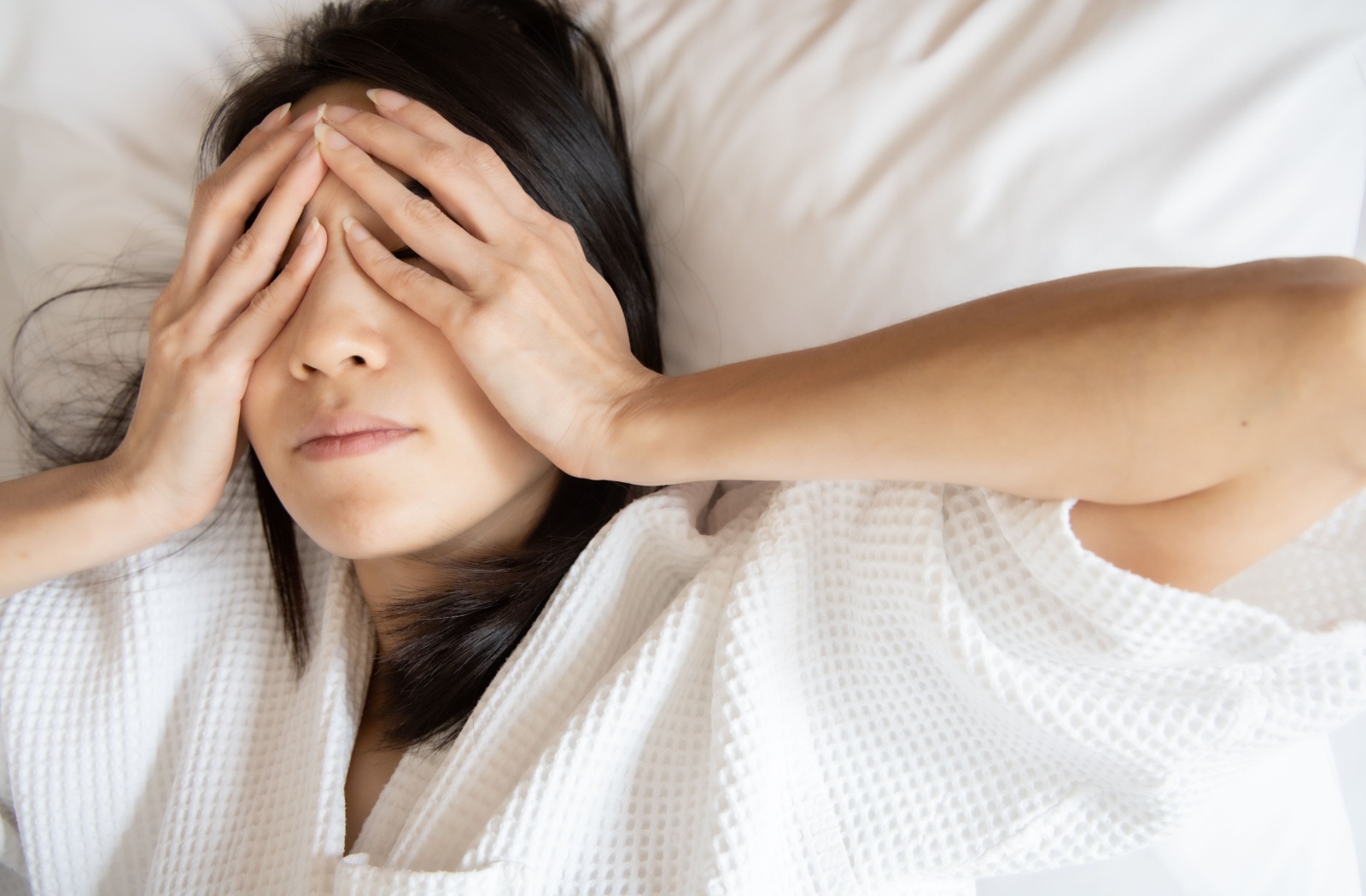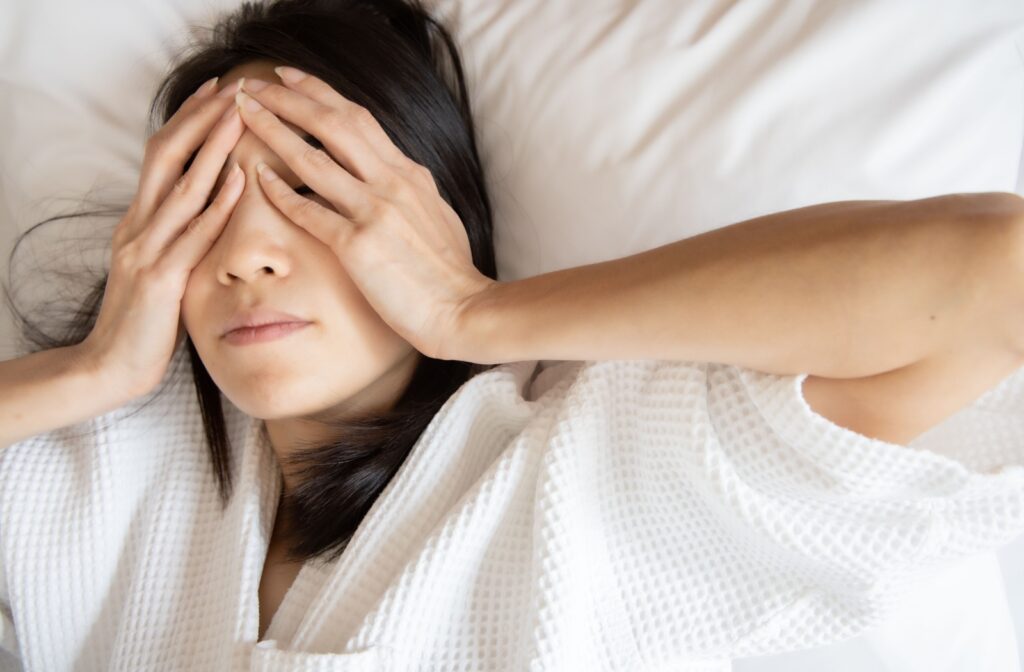Waking up with dry, irritated eyes is an all-too-common problem that can make your mornings uncomfortable. Several factors could be at play, such as:
- Your sleep environment
- Your sleep position
- Tear production issues
- Underlying medical conditions like rosacea
By identifying these potential causes and understanding their impact, you can take the right steps to improve your eye comfort, ensuring your mornings start on a brighter and more comfortable note.
Environmental Factors Affecting Eye Moisture
The environment where you sleep plays a significant role in eye moisture. If your bedroom lacks humidity, it could be drying out your eyes overnight.
Dry air from air conditioning or heating systems can strip moisture from the air and your eyes. Using a humidifier can add necessary moisture back into the air, helping to keep your eyes hydrated.
Allergens such as dust mites and pet dander can also irritate your eyes. Ensure your sleeping environment is clean and free from these irritants to minimize their impact on your eye health.
Sleep Position & Its Impact on Dry Eye
How you sleep can affect your eye health as well. Certain sleep positions can aggravate dry eye symptoms.
Sleeping on your stomach or side can put pressure on your eyes, which can cause your eyes to remain slightly open during the night. This can lead to chronic dry eyes.
Using an eye mask can help keep your eyelids closed and reduce exposure to air. Also, consider changing your pillowcase regularly to keep it free from dust and allergens.
The Role of Tear Production in Dry Eye
Tears play a crucial role in maintaining eye health. They:
- Lubricate the eyes
- Wash away debris
- Provide essential nutrients
If your tear production is insufficient, your eyes can become dry and irritated. Age, hormonal changes, and certain medical conditions can reduce tear production.
Artificial tears or lubricating eye drops can help supplement natural tear production. Using these products before bed can keep your eyes moist throughout the night.
Medical Conditions Linked to Dry Eye
Certain medical conditions can increase the likelihood of waking up with dry eyes. Diabetes, rheumatoid arthritis, and thyroid disorders are known to impact eye health.
These conditions can affect tear production or change the composition of your tears, leading to dryness.
Additionally, sleep apnea and the use of CPAP machines can contribute to dry eyes. If you suspect a medical condition is causing your dry eyes, consult with a healthcare professional for a proper diagnosis and treatment plan.
Rosacea & Dry Eye
Rosacea is a widespread skin condition characterized by redness and visible blood vessels on your face. Ocular rosacea occurs when the chronic skin condition of rosacea spreads to the eyes.
This particular form of rosacea causes constant inflammation of the eyelids and affects tear production, leading to eye discomfort and complications if left untreated.
People suffering from ocular rosacea commonly report a variety of symptoms, including:
- Persistent redness
- A stinging or burning sensation
- Dryness in the eyes
- Watery eyes or tearing
- Fluctuating vision
To effectively manage these symptoms and mitigate the impact of rosacea on eye health, it is important to consult with healthcare professionals. Optometrists specializing in dry eye disease and advanced treatments will offer assessments to diagnose ocular rosacea and help determine treatment plans.
Medications That Can Contribute to Dry Eye
Certain medications can cause or worsen dry eye symptoms. A few examples include:
- Antihistamines
- Antidepressants
- Blood pressure medications
If you suspect your medication is causing dry eyes, speak with your eye doctor about possible alternatives and treatments.
How to Prevent Morning Dry Eye
Preventing morning dry eye involves a combination of lifestyle changes and environmental adjustments. Here are some tips:
- Use a humidifier in your bedroom to maintain adequate moisture levels in the air.
- Stay hydrated by drinking plenty of water throughout the day.
- Avoid sleeping with fans directly blowing on your face as they can dry out your eyes.
- Maintain proper eyelid hygiene by gently cleaning your eyelids before bed to remove any debris or allergens.
Effective Treatments for Dry Eye
Several treatments can help alleviate dry eye symptoms. Depending on the cause, some over-the-counter or prescription options can help provide relief.
- Lubricating eye drops or artificial tears can provide immediate relief for dry eyes. Use these products as a supplement to your own natural tears.
- Intense Pulsed Light (IPL) therapy is a treatment available for facial rosacea and ocular rosacea reducing redness and inflammation which is the underlying cause of dry eye disease. This is a great preventative as well.
- Radiofrequency treatments enhance tear production by unclogging eyelid glands. Radio frequency energy is used to gently heat the eyelid glands which produce oil that prevent tear evaporation.
- Punctal plugs, which are small devices inserted into the tear ducts to slow down drainage of your natural tears. This helps retain your natural tears on the surface of your eyes for longer for longer moisturizing contact time. This procedure is a quick and non-invasive procedure, offering longer-term relief for chronic dry eyes.
Get Help with Morning Dry Eye
By addressing environmental factors, adjusting sleep positions, and seeking appropriate treatments, you can significantly reduce morning dry eye symptoms and prevent this disease process from progressing.
Remember, maintaining good eye health is essential for your overall well-being. To find out if you can benefit from treatments or prevention treatments, book an appointment with Luminance Vision for a thorough evaluation and a personalized treatment plan.




